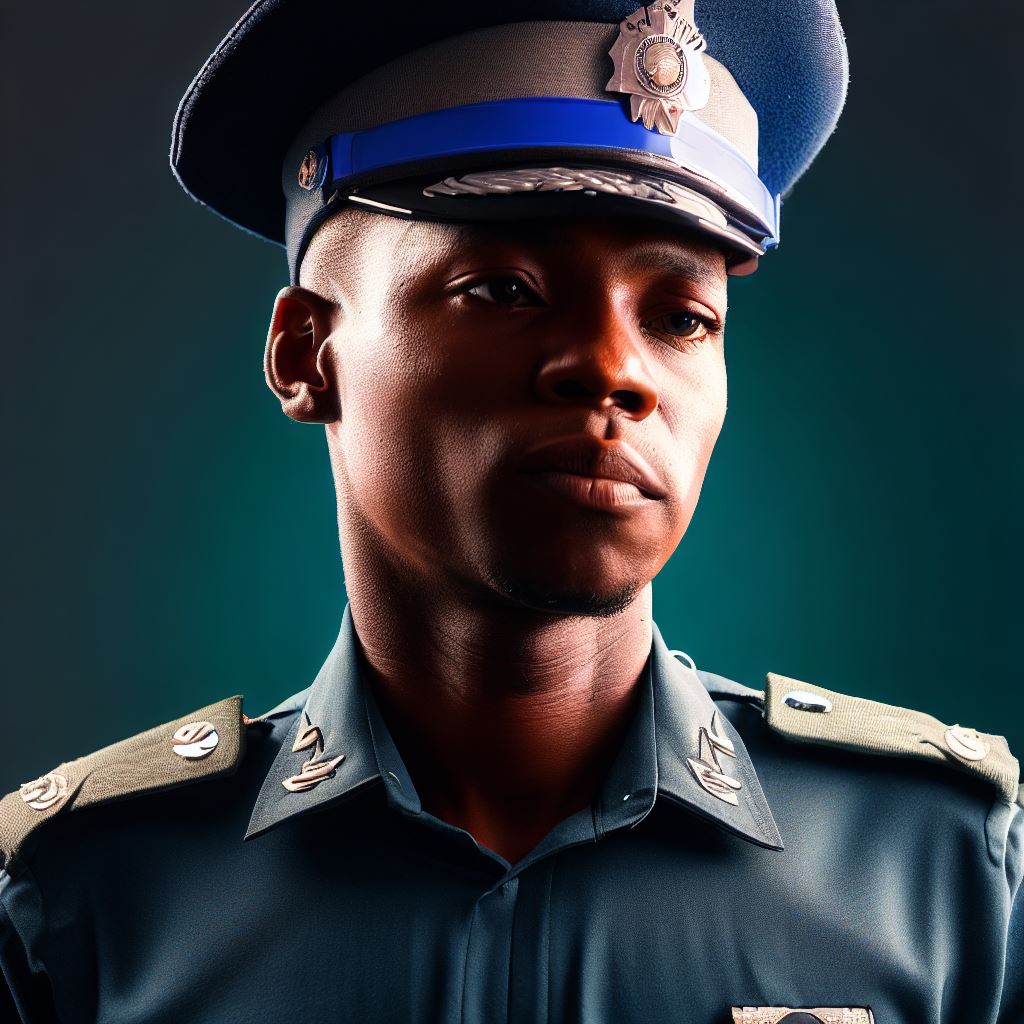Introduction
Police training academies play a crucial role in Nigeria, as they are essential for the development and improvement of the country’s police force.
This blog post aims to highlight the importance of these academies and provide an overview of the purpose of this post.
Police training academies in Nigeria are vital because they equip officers with the necessary skills and knowledge to effectively carry out their duties.
These academies offer rigorous training programs that cover various aspects of law enforcement, including crime prevention, investigation techniques, and community policing.
The importance of these academies cannot be overstated, as they contribute significantly to the professionalism and efficiency of the Nigerian police force.
Well-trained officers are better equipped to handle the challenges and complexities of modern policing, ultimately leading to enhanced public safety and security.
The purpose of this blog post is to shed light on the significance of police training academies in Nigeria.
By discussing their role in shaping the capabilities and standards of the police force, this post aims to emphasize the need for continuous improvement and investment in these academies.
By understanding the importance of police training academies, readers can gain insight into the efforts being made to enhance law enforcement in Nigeria.
This knowledge can foster a sense of confidence in the abilities and professionalism of the Nigerian police force, while also highlighting areas for further development and improvement.
In the upcoming sections, we will delve into the various aspects of police training academies in Nigeria, exploring their curriculum, training methods, and the impact they have on the overall performance of the police force.
Stay tuned for an informative and insightful journey into the world of police training academies in Nigeria.
Overview of Police Training Academies in Nigeria
Basic information about police training academies
In Nigeria, police training academies serve as institutions that train and educate aspiring police officers. These academies provide extensive training programs, including both theoretical and practical lessons.
Number of police training academies in Nigeria
Currently, Nigeria has a total of six police training academies spread across various regions within the country.
These academies are strategically located to ensure accessibility for prospective police officers from different areas.
Their role in shaping the police force
Police training academies play a crucial role in shaping the Nigerian police force.
They are responsible for equipping recruits with the necessary knowledge, skills, and values required to maintain law and order effectively.
The training provided focuses on both legal aspects and practical situational tactics.
List of Police Training Academies in Nigeria
- Police Academy, Kano: Located in Kano State, the Police Academy is the oldest and most prestigious training institution in Nigeria.
It offers a comprehensive five-year degree program in Police Science and other related courses. - Police College, Ikeja: Situated in Lagos State, the Police College in Ikeja offers a wide range of training programs for recruits at different levels.
It provides both basic recruit training and specialized courses for advanced officers. - Police Training School, Jos: Located in Plateau State, the Police Training School in Jos delivers basic recruit training to new cadets.
This academy focuses on discipline, physical fitness, and the fundamentals of policing. - Police Training School, Oji River: Situated in Enugu State, the Police Training School in Oji River offers training programs for recruits.
It provides theoretical and practical teachings to prepare officers for their future roles. - Police Training School, Lafia: Based in Nasarawa State, the Police Training School in Lafia primarily focuses on training officers in handling specialized areas such as anti-terrorism operations, riot control, and intelligence gathering.
- Police Training School, Minna: Located in Niger State, the Police Training School in Minna offers various courses for police officers at different stages of their careers.
It conducts specialized training in areas such as detective work and forensic investigation.
In fact, police training academies in Nigeria are vital institutions that shape the country’s police force.
With six academies spread across different regions, they provide comprehensive training programs to aspiring officers.
Through these academies, Nigeria aims to equip its police force with the necessary skills and knowledge to maintain law and order effectively.
Read: A Day in the Life of a Nigerian Police Officer
Admission Process
Requirements for admission into a police training academy
Educational Qualifications
- Applicants must possess a minimum of a high school diploma or its equivalent.
- A good understanding of English language is necessary.
- Basic computer literacy is an added advantage.
Age Limit
- The minimum age requirement is usually 18 years, while the maximum age limit is around 28-30 years.
- Exceptions may be made for candidates with previous law enforcement experience.
Physical Fitness
- Candidates have to pass a physical fitness test to demonstrate their physical capabilities.
- This test includes exercises such as running, push-ups, sit-ups, and agility drills.
Medical Examination
- All prospective candidates undergo a thorough medical examination to ensure they are physically fit for the demanding tasks of police work.
- Medical evaluations include vision and hearing tests, as well as general health assessments.
Application procedures
Obtain Application Form
- Interested individuals can obtain the application form either online or directly from the police training academy.
- The form can also be obtained from designated police stations or advertised in local newspapers.
Fill out the Form
- Applicants must carefully fill out the application form, providing accurate personal and educational information.
- Any false information may lead to disqualification from the admission process.
Attach Required Documents
- Along with the application form, candidates must attach necessary documents such as educational certificates, birth certificate, and a recent passport-sized photograph.
- These documents serve as evidence of the candidate’s qualifications and eligibility.
Pay Application Fee
- Applicants are required to pay a non-refundable application fee as specified by the police training academy.
- The fee is typically paid through designated banks or online payment platforms.
Evaluation criteria
Entrance Examination
- All applicants must pass a written entrance examination that assesses their knowledge in subjects such as English, mathematics, and general aptitude.
- The examination may also include questions related to law enforcement and current affairs.
Physical Fitness Test
- Candidates are evaluated based on their performance in the physical fitness test.
- Qualifying standards for each exercise are predefined, and candidates must meet or exceed these standards to move forward.
Interview
- Successful candidates from the written examination and physical fitness test are invited for an interview.
- The interview panel assesses the candidate’s communication skills, problem-solving abilities, and overall suitability for a career in law enforcement.
Background Check
- Potential candidates undergo a comprehensive background check, including verification of their educational qualifications, criminal record, and references.
- This helps ensure that only individuals of good moral character are admitted to the police training academy.
In short, the admission process for police training academies in Nigeria involves meeting specific requirements, following the proper application procedures, and undergoing various evaluations.
It is essential for applicants to fulfill the educational qualifications, demonstrate physical fitness, and pass the entrance examination, interview, and background check.
By adhering to these criteria, individuals can pursue a career in law enforcement and contribute to the safety and security of society.
Read: Understanding Police Ranks and Structures in Nigeria
Curriculum and Training Programs
In this section, we will explore the curriculum and training programs offered at police training academies in Nigeria.
These programs are designed to equip aspiring police officers with the necessary knowledge and skills to effectively carry out their duties.
Overview of the Curriculum
The curriculum taught at police training academies covers a wide range of subjects that are essential for a career in law enforcement.
The courses are carefully designed to provide a comprehensive understanding of the criminal justice system and its various components.
Subjects such as criminal law, constitutional law, and evidence are taught to ensure that trainees have a strong foundation in legal aspects related to law enforcement.
Additionally, courses on police ethics, human rights, and community policing are included to foster a balanced approach to policing.
Areas of Focus
Police training programs in Nigeria place a significant emphasis on three main areas of focus – law enforcement, crime prevention, and community engagement.
- Law enforcement: Trainees are taught the procedures and techniques necessary to enforce laws and maintain public order.
- Crime prevention: Courses on crime prevention strategies, criminal investigation, and intelligence gathering are included to equip trainees with the skills to prevent and combat crime.
- Community engagement: Recognizing the importance of community involvement, trainees are educated on building trust, fostering positive relationships, and solving problems collaboratively with the communities they serve.
Training Methods
Police training academies in Nigeria employ a combination of theoretical and practical components to ensure trainees receive a holistic learning experience.
Theoretical components involve classroom lectures, where trainees learn about legal frameworks, police procedures, and community policing principles.
These lectures provide the necessary theoretical knowledge required for effective policing. Practical components of the training programs include hands-on exercises, simulations, and field training.
Trainees get the opportunity to apply their theoretical knowledge in real-life scenarios, enhancing their critical thinking and decision-making abilities.
These practical exercises also help develop their physical fitness and operational skills.
Furthermore, trainees undergo rigorous physical fitness training to improve their endurance, strength, and overall fitness levels.
This aspect of training is crucial to ensure officers are physically capable of performing their duties efficiently.
To keep up with evolving trends and advancements in law enforcement, police training academies regularly update their curriculum and training methods.
This ensures trainees are equipped with the latest knowledge and skills needed to address contemporary policing challenges effectively.
In review, the curriculum and training programs offered at police training academies in Nigeria are tailored to produce well-rounded police officers capable of upholding the law, preventing crime, and engaging with the community.
By combining theoretical knowledge with practical training, these programs prepare trainees for the demanding and critical role of law enforcement in society.
Read: Life as a Military Officer’s Spouse in Nigeria
Duration of Training
When it comes to police training academies in Nigeria, the duration of training programs varies depending on various factors.
In this section, we will explore the average length of police training, how it differs based on ranks, and the importance of a comprehensive training period.
Average Length of Police Training Programs in Nigeria
- The average length of police training programs in Nigeria ranges from 6 months to 1 year.
- This training period is designed to equip recruits with the necessary skills and knowledge.
- During this time, recruits undergo rigorous physical and mental training to prepare them for the challenges they may face.
Variation in Training Duration Based on Ranks
- The duration of police training programs may vary based on the rank the recruits are training for.
- For example, the training period for recruits aiming to become police constables may be shorter compared to those aspiring to become officers.
- Higher-ranking officers often undergo more specialized and intensive training, which requires a longer duration.
Importance of Comprehensive Training Period
- A comprehensive training period is crucial for police officers to develop the necessary skills and competence.
- It allows recruits to acquire a deep understanding of law enforcement principles, procedures, and techniques.
- By undergoing an extensive training program, officers are better equipped to handle various situations they may encounter in their line of duty.
- Training also emphasizes the importance of discipline, professionalism, and ethical conduct within the police force.
- Adequate training reduces the likelihood of misconduct and abuse of power among police officers.
- It instils a sense of responsibility and accountability while ensuring officers have the knowledge to protect and serve the community effectively.
In general, the duration of police training programs in Nigeria plays a vital role in shaping competent and capable officers.
The average length of training, which varies from 6 months to 1 year, allows recruits to undergo rigorous physical and mental preparation.
Additionally, the duration may differ based on the rank the recruits are training for, with higher-ranking officers undergoing more specialized training.
A comprehensive training period is essential as it equips officers with the necessary skills, knowledge, and values to carry out their duties effectively and ethically.
By investing in comprehensive training, Nigeria can ensure a professional and responsible police force that serves and protects its citizens.
Read: Medical Requirements for Military Officers in Nigeria

Subjects and Areas of Study
At police training academies in Nigeria, a variety of subjects are taught to equip aspiring police officers with the necessary knowledge and skills for effective policing.
Core Subjects Taught at Police Training Academies
The core subjects taught at police training academies are designed to provide a solid foundation for all police officers. These subjects include:
- Law Enforcement and Criminal Justice: Understanding the legal framework and the criminal justice system is essential for effective policing.
- Police Procedures and Tactics: Police officers are trained in various procedures, tactics, and techniques to handle different situations they may encounter on duty.
- Community Policing: Emphasizing the importance of building positive relationships with the community and working collaboratively to prevent crime.
- Emergency Response and Crisis Management: Preparing officers to handle emergencies, disasters, and crisis situations efficiently and effectively.
- Ethics and Professionalism: Instilling the values of integrity, honesty, and professionalism among police officers.
Specialized Training for Different Roles within the Police Force
Police training academies also provide specialized training to cater to the specific roles and responsibilities within the police force.
This specialized training ensures that officers are equipped with the necessary skills for their respective positions.
Investigators, for example, undergo extensive training in crime scene investigation, evidence collection, and interrogation techniques.
This prepares them to conduct thorough and effective investigations to bring criminals to justice.
Traffic police officers undergo specialized training in traffic laws, accident investigation, and traffic management.
This enables them to ensure smooth traffic flow, enforce traffic regulations, and minimize road accidents.
Specialized units such as the Special Weapons and Tactics (SWAT) teams, anti-terrorism squads, and cybercrime units also receive specific training tailored to their respective areas of expertise.
Importance of the Subjects in Building Necessary Skills for Effective Policing
The subjects taught at police training academies play a crucial role in building the necessary skills for effective policing. Here’s why:
Law Enforcement and Criminal Justice subjects provide officers with a solid understanding of the laws they are meant to uphold and how the criminal justice system operates.
This knowledge allows them to make informed decisions and act within the confines of the law.
Police Procedures and Tactics subjects equip officers with practical skills and techniques to handle various situations effectively.
These subjects enhance their problem-solving abilities, decision-making skills, and ability to de-escalate conflicts.
Community Policing subjects emphasize the importance of building trust and collaboration with the community.
By understanding the community’s concerns and working together, officers can prevent crime more effectively and foster safer neighborhoods.
Emergency Response and Crisis Management subjects ensure officers are prepared to handle emergencies promptly.
Rapid response and efficient crisis management are crucial in saving lives and minimizing damage during critical situations.
Ethics and Professionalism subjects instill the values necessary for officers to serve with integrity, respect, and professionalism.
These subjects emphasize behaving ethically, treating individuals fairly, and upholding human rights.
Specialized training for different roles within the police force ensures officers possess the necessary skills for their specific duties.
This specialization enhances overall departmental effectiveness and improves the quality of policing services offered to the public.
In essence, police training academies in Nigeria offer a well-rounded curriculum with core subjects and specialized training.
We carefully select these subjects to provide officers with vital knowledge and skills, ensuring effective, professional policing.
Physical and Fitness Training
In order to become effective police officers, it is crucial for recruits to undergo vigorous physical and fitness training.
This section will discuss the importance of physical fitness for police officers, the training exercises and activities conducted to enhance their physical capabilities, and the role of physical training in stress management and overall wellbeing of officers.
Importance of Physical Fitness for Police Officers
- Enhances overall strength, endurance, and agility
- Improves reaction time and coordination in critical situations
- Boosts cardiovascular health and reduces the risk of diseases
- Enhances overall mental alertness and concentration
Police officers must maintain physical fitness due to demanding situations requiring strength, agility, and rapid decision-making.
Training Exercises and Activities Conducted to Enhance Physical Capabilities
- Cardiovascular exercises such as running, cycling, and swimming
- Strength training exercises like weightlifting and resistance training
- Endurance activities such as obstacle courses and long-distance running
- Combat training and martial arts for self-defense
Police training academies incorporate a wide range of exercises and activities to improve the physical capabilities of recruits.
These exercises not only focus on building strength and endurance but also emphasize essential skills like self-defense.
Role of Physical Training in Stress Management and Overall Wellbeing of Officers
- Reduces stress levels by releasing endorphins and increasing overall mental wellbeing
- Improves sleep quality and promotes healthy lifestyle choices
- Helps police officers cope with the physical demands of their job and reduce the risk of injuries
Physical training plays a vital role in managing the stress levels of police officers. Regular exercise helps release endorphins, which are natural stress fighters.
Additionally, it improves sleep quality, leading to better mental and physical health.
Moreover, physical training prepares officers for the physical demands of their job, reducing the risk of injuries and ensuring they can effectively perform their duties.
Basically, physical and fitness training is of utmost importance for police officers. It enhances their overall physical capabilities, improves their mental alertness, and reduces the risk of diseases.
The training exercises and activities conducted during police training academies focus on cardiovascular health, strength training, endurance, and combat skills.
Furthermore, physical training plays a significant role in stress management and overall wellbeing, ensuring that officers can cope with the demands of their job effectively.
Practical Training and Field Experience
Practical training and field experience play a crucial role in shaping the skills and competencies of police trainees in Nigeria.
It provides them with the necessary hands-on experience and exposure to real-life situations they may encounter once they become full-fledged police officers.
Internship or Field Attachment Opportunities During Training
- Trainees are given the chance to participate in internships or field attachment programs during their training.
- These opportunities allow them to observe and learn from experienced police officers in real-life settings.
- Trainees can apply the theoretical knowledge gained in the academy to practical situations they encounter during their attachment.
- Internships also familiarize trainees with the different departments and units within the police force, giving them a deeper understanding of police operations.
Learning from Experienced Police Officers on Duty
- Trainees have the privilege of learning directly from experienced police officers who are on active duty.
- These officers act as mentors and guides, imparting their knowledge, skills, and practical wisdom to the trainees.
- By observing how experienced officers handle challenging situations, trainees can gain valuable insights and develop their own problem-solving capabilities.
- Mentoring relationships established during training often continue even after trainees become full-fledged officers, providing ongoing support and guidance.
Simulated Scenarios to Prepare Trainees for Real-life Situations
- Simulated scenarios are an integral part of practical training in police academies.
- Trainees are exposed to various scenarios that they may encounter in the line of duty.
- These scenarios are designed to replicate real-life situations, allowing trainees to practice and refine their response skills.
- By engaging in simulated scenarios, trainees become more confident and better equipped to handle challenging and high-pressure situations.
- Feedback from trainers and peers helps trainees analyze their performance and identify areas for improvement.
Practical training and field experience enable police trainees to bridge the gap between theory and practice.
It equips them with the necessary skills, knowledge, and confidence to carry out their duties effectively once they join the police force.
Internships and field attachments provide a valuable opportunity for trainees to witness firsthand the realities of police work and learn from experienced officers.
Additionally, learning directly from active duty officers allows trainees to benefit from their expertise and develop their own problem-solving capabilities.
Simulated scenarios further enhance their practical skills by preparing them for real-life situations they may encounter on the job.
By integrating these elements into police training academies, Nigeria can ensure that its future police officers receive comprehensive and effective preparation for their roles in maintaining law and order in the nation.
Explore Further: Challenges and Risks in Nigeria’s Bomb Disposal Industry
Ethical and Professional Standards
In order to establish a strong and respected police force in Nigeria, police training academies must place a strong emphasis on integrity, ethics, and professionalism.
It is essential to instill these values in trainees throughout their training.
Integrity, ethics, and professionalism in police training
- Trainees should be taught the importance of upholding ethical principles and maintaining high professional standards.
- Integrity should be emphasized as a core value that all police officers must possess and demonstrate while on duty.
- Trainees should be educated about the potential consequences of unethical behavior, including how it can harm the public’s trust in the police force.
- Role-playing exercises and real-life scenarios can be utilized to test and reinforce ethical decision-making skills.
Codes of conduct and adherence to laws and regulations
- Police training academies should establish comprehensive codes of conduct that outline expected behavior and actions for trainees.
- These codes of conduct should clearly state the laws and regulations that trainees must adhere to during their training and throughout their careers as police officers.
- Regular training sessions should be conducted to ensure trainees fully understand these codes of conduct and their implications.
- Trainees should also be educated about the consequences of violating these codes of conduct, including potential disciplinary actions and legal implications.
Enforcement of discipline to maintain high standards
- Police training academies should have a strict disciplinary system in place to address any misconduct or violations of the established codes of conduct.
- Disciplinary actions should be consistent and fair, ensuring that trainees understand the consequences of their actions.
- Regular evaluation and assessment of trainees’ behavior and performance should be conducted to identify any potential concerns or areas for improvement.
- Mentorship programs can be implemented to provide ongoing guidance and support for trainees, helping them develop and maintain high professional standards.
By placing a strong emphasis on integrity, ethics, and professionalism in police training academies, Nigeria can ensure that its police force operates with the highest standards.
Codes of conduct and adherence to laws and regulations will serve as guidelines for trainees, promoting accountability and preventing misconduct.
The enforcement of discipline will further contribute to upholding these standards and building public trust in the police force.
Discover More: Cadet Life in Nigeria: A Military Officer’s Start
Challenges and Improvements
Police training academies in Nigeria face several challenges that hinder the effectiveness of their programs.
Identifying these challenges is crucial in order to find effective solutions for improvement.
Current Challenges
- Insufficient infrastructure and outdated training facilities affect the quality of training.
- Inadequate funding restricts the ability to provide comprehensive and modern training programs.
- Outdated curriculums that do not align with the evolving nature of policing.
- Lack of qualified trainers with up-to-date knowledge and expertise in relevant areas.
- Limited emphasis on practical training, hindering the skills development of recruits.
Suggestions for Improvement
- Updating curriculums regularly to reflect the current challenges and needs of modern policing.
- Ensuring trainers possess the necessary qualifications, expertise, and practical experience.
- Providing sufficient funding to improve infrastructure and training facilities.
- Emphasizing practical training exercises to equip recruits with essential skills.
- Integrating new technologies and techniques into training programs to adapt to modern policing methods.
Importance of Continuous Evaluation and Updating
To ensure the effectiveness and relevance of police training academies, continuous evaluation and updating of training programs are vital.
Regular evaluation allows for the identification of any shortcomings or gaps in the training, which can be addressed promptly. This process helps in improving the quality and efficiency of the training programs.
Updating the training programs encourages constant improvement and adaptation to the changing dynamics of policing.
It enables the inclusion of new methodologies and technologies that can enhance the skills and knowledge of recruits.
Furthermore, by continuously evaluating and updating training programs, police personnel stay equipped to effectively address emerging challenges and crimes.
Society evolves, and so must the training academies. The challenges faced by police training academies in Nigeria call for significant improvements in various aspects of their programs.
Upgrading infrastructure, curriculums, and trainers’ qualifications is necessary to ensure effective training.
Continuous evaluation and updating of training programs are equally important to stay relevant and address the evolving dynamics of policing.
By implementing these improvements, police training academies can produce highly skilled and competent personnel capable of maintaining law and order in the country.
Conclusion
Police training academies in Nigeria play a vital role in effective law enforcement.
They provide aspiring police officers with the necessary skills and knowledge to perform their duties efficiently.
These academies are significant as they produce well-trained officers who can maintain law and order in the country.
It is essential for aspiring police officers to recognize the importance of undergoing proper training in these academies.
Through rigorous training, they can develop the necessary competencies needed for their profession.
This includes learning about laws and regulations, handling firearms, conflict resolution, and community engagement.
Recognizing police training academies’ importance, Nigeria can ensure a well-prepared police force for crime prevention and societal peace.
These academies provide the foundation for building a professional and competent law enforcement agency.
For those aspiring to join the police force, it is crucial to choose the right training academy and commit to the training process.
They will gain the knowledge and skills needed for effective community service and protection.
Police training academies in Nigeria are not just educational institutions but pillars of effective law enforcement.
Aspiring police officers should seize the opportunity to undergo proper training in these academies, as it will pave the way for a successful career in maintaining peace and order in our society.




